19 Best Feng Shui Plants for Wealth, Prosperity, and Luck
The practice of feng shui focuses on balancing the elements in your home to create an auspicious, positive, free flow of energy throughout the space. Using the principles of feng shui, you can also incorporate houseplants into your designs to encourage and invite the energies of wealth, prosperity, and good luck to come into your home.
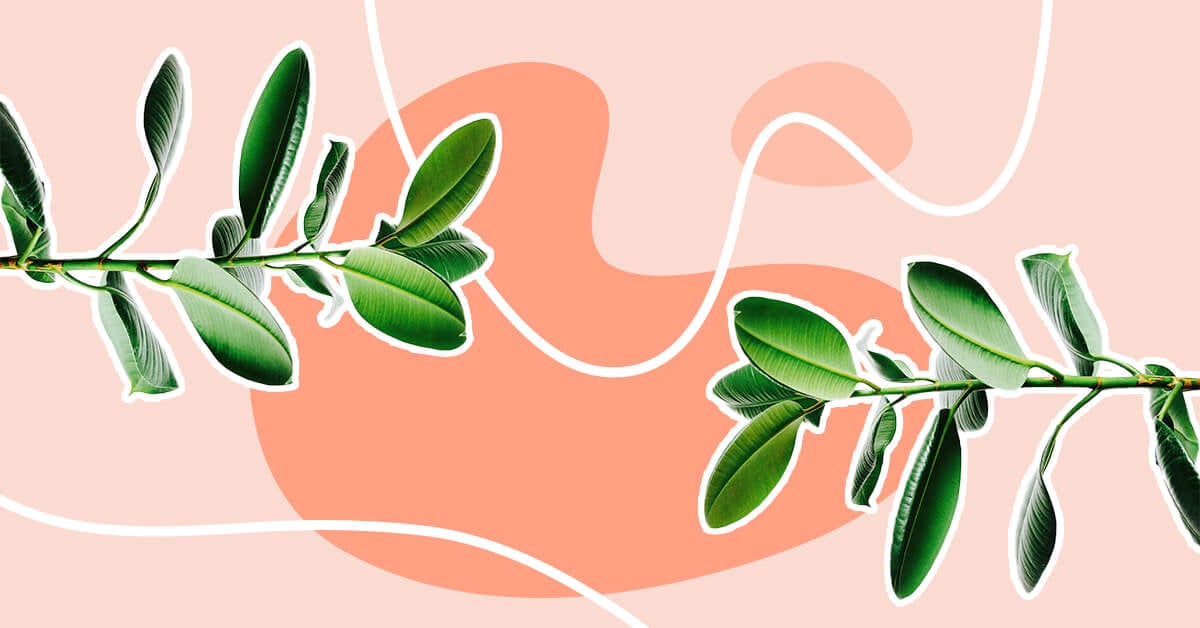
Key Takeaways
The best plants for wealth, prosperity, and luck in feng shui include plants with soft and/or rounded, coin-shaped leaves that do not have sharp edges or silhouettes. Some of the most auspicious plants in feng shui include lucky bamboo, money trees, golden pothos, hade plants, and Boston ferns.
The Role of Plants in Feng Shui
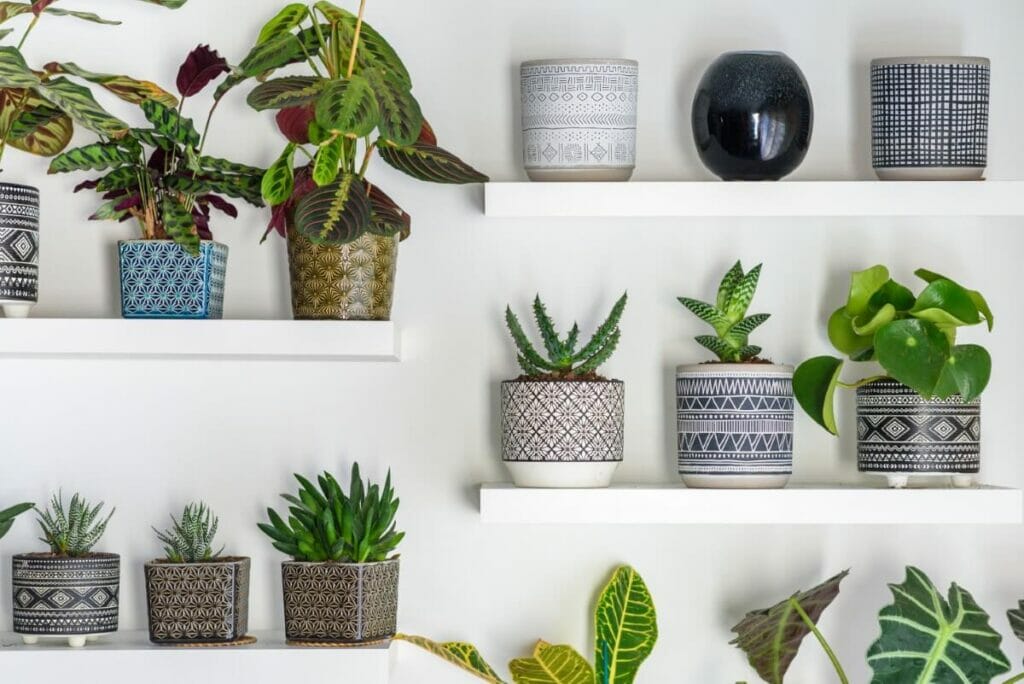
Feng shui is all about creating a home design that fosters a balanced, positive, and nurturing energy inside your home. This harmony of energy is partly achieved by balancing the elements of wood, earth, metal, water, and fire in each space within your home.
These elements are all represented by different types of objects, materials, and colors. Plants are associated with wood energy. Since they need to be watered, they can also sometimes be associated with water energy.
Wood energy, like that drawn in and generated by houseplants, adds growth, flexibility, vitality, human heartedness, and kindness to a space.
About Wealth, Prosperity, and Luck in Feng Shui and on the Bagua Map

Feng shui design is informed by a chart called a Bagua map. The Bagua map can be used to divide the home (as a whole), each room, or even each surface into separate sections. Each section corresponds to an area of life, an element (and its corresponding colors, shapes, and materials), and a cardinal direction.
- North – Career; water element
- Northwest – Helpful people and travel; metal element
- West – Children and creativity; metal element
- Southwest – Love and partnerships; earth element
- South – Fame and reputation; fire element
- Southeast – Wealth and prosperity; wood element
- East – Family and health; wood element
- Northeast – Knowledge and cultivation; earth element
- Center – Health and wellbeing; earth element
With a Bagua map, the cardinal directions are aligned with north at the front entrance of the home or of a room – not actually aligned with the actual cardinal directions and the house’s orientation with a compass.
Plants can be placed in locations in the home that correspond with the sections of the Bagua map that are associated with the wood element. However, they can also be placed in those sections of rooms in other corners of the home to draw growth and vitality into other areas of your life. For example, to draw positive energy into the career section of your life, then you could place a houseplant in the east or southeast corner of the north portion of your home.
The Best Plants for Wealth, Prosperity, and Luck in Feng Shui
When selecting houseplants for feng shui purposes, it’s important to choose healthy plants that generally have soft or rounded leaves to draw the most positive types of energy. These types of plants are considered auspicious. On the other hand, sick, dying, dead, sharp, or spiky plants can create negative energy (poison arrows) in a space.
1. Rubber Plant (Ficus elastica)

Rubber plants are said to draw good luck, wealth, and prosperity in feng shui. They require bright, filtered sunlight, evenly moist soil, and a well-draining container to thrive.
These plants have oval-shaped, glossy green leaves and can grow to be between 8 and 11 feet tall indoors. Although this height is more manageable than the nearly 100 feet they can reach in their natural habitat, it is best to place yours in a large enough location that you do not create any energy blocks or draw too much energy into a small space.
2. Citrus Trees (Citrus)

All plants that bear fruit are considered prosperous and lucky in feng shui – even if they are unlikely to actually blossom and produce fruit when grown indoors. Plants, like indoor citrus trees (orange, lemon, grapefruit, or lime), can help create abundance, growth, and positive energy in any aspect of your life, according to its placement on the Bagua map.
Citrus trees require as much direct, bright sunlight as possible each day; more than six hours is ideal. So, unless you have a very sunny location in your home to support a thriving, healthy citrus tree, it might be advisable to choose a different plant from this list because unhealthy, struggling plants can generate negative energy.
3. Ginseng Ficus (Ficus retusa and Ficus microcarpa)

Ginseng ficus plants are considered to be good luck in feng shui. They can also generate an energy of abundance and wealth since they are members of the fig tree family and can bear fruit. Additionally, ginseng ficus plants are experts at purifying the air.
Ginseng ficus plants are typically cultivated as Bonsai trees to restrict their natural growth. They develop thick, bulbous trunks that sprout delicate branches of soft, ovate leaves. These plants require full sun, humidity (spritzing the leaves daily with water can be beneficial), and evenly moist soil in a well-draining pot to thrive. It’s also essential to stay on top of common ficus ginseng pests, bugs, and diseases.
4. Jade Plant (Crassula ovata)

Jade plants are so strongly associated with good luck, wealth, and prosperity that other common names for them include money plant and lucky plant. These succulents have softly rounded, coin-shaped leaf segments and sturdy brown stems that look like small tree trunks.
Jade plants require at least six hours of bright sunlight each day, with younger plants preferring indirect or filtered sunlight and more mature plants preferring a bit of direct sunlight. Water a jade plant generously when its soil has dried completely and allow all excess water to drain from its pot. With proper care, jade plants aren’t overly susceptible to pests and diseases.
Jade plants are also relatively slow-growing and won’t take over any spaces in your home or office.
5. Aloe Vera (Aloe vera)

Aloe vera plants have spiny, sharp, lance-shaped leaf segments that would normally be associated with negative energy and poison arrows in feng shui. So, it is somewhat surprising that aloe vera is considered to be an auspicious plant in feng shui that draws positive energy and good luck into the home. This is largely due to its widely known health and healing properties.
Aloe vera plants are desert succulents and require similar conditions to grow well. Yours will need well-draining soil, lots of direct sunlight, a warm location, and very spare watering. An aloe vera plant should only be watered once every two to three weeks in the summer and even less during the winter dormancy period.
6. Money Tree Plant (Pachira aquatica)

Another plant given the common name money tree, the Pachira aquatica is thought to draw in lucky energy, wealth, and prosperity in feng shui. They have soft, fluttery, ovate leaves and sturdy, brown stems that are typically braided as they are grown.
Money trees grow best when placed in a location that is free from drafts of cold or hot and dry air. Additionally, you’ll want to be sure that your money tree receives plenty of bright, filtered sunlight while keeping its soil evenly moist but never soggy. Money trees are particularly susceptible to root rot.
7. Parlor Palm (Chamaedorea elegans)
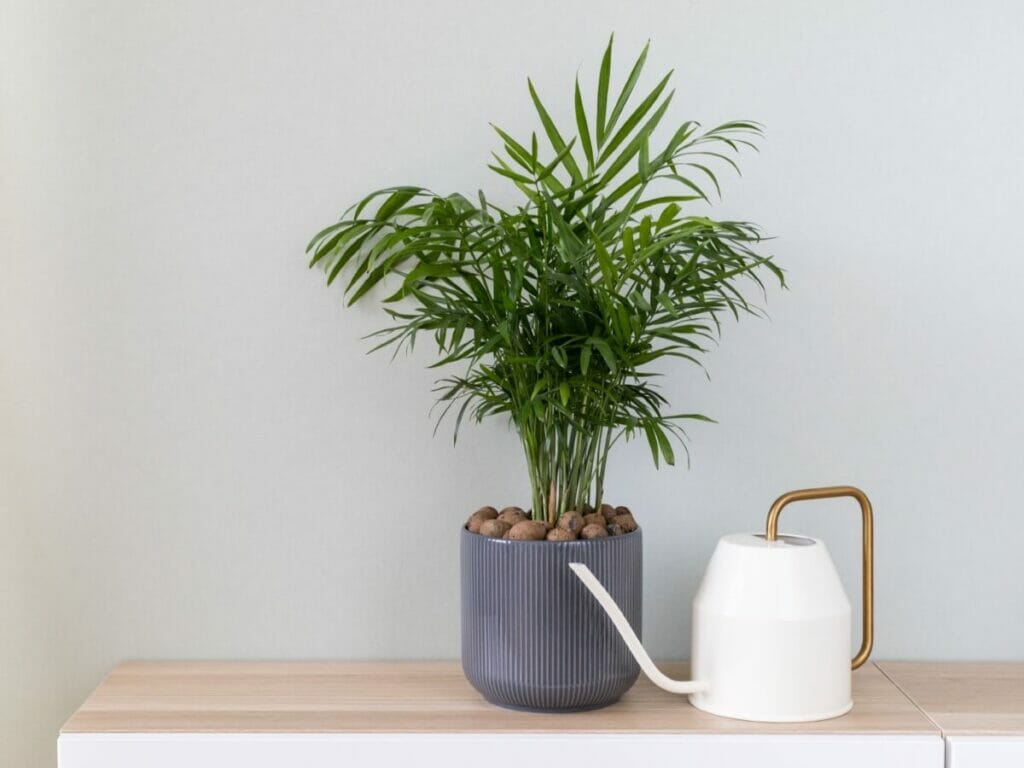
In feng shui, parlor palms are classified as good luck plants. They have thick tufts of soft palm leaves that sprout in all directions and are perfect for drawing in positive energy while absorbing and neutralizing negative poison arrows. In feng shui, indoor palms, in general, are used to bring balance and harmony to indoor spaces. They are also great air purifiers.
Parlor palms thrive in medium to bright indirect or filtered sunlight in warm and humid environments. Water a parlor palm only when its soil has dried out, and allow all the excess water to drain from the pot.
8. Spider Plants (Chlorophytum comosum)

Spider plants are lucky plants that draw positive energy into any location they are placed in a home. They also have powerful air-purifying abilities that will improve any indoor environment.
Spider plants are one of the easiest and most adaptable indoor plants to grow which makes it a perfect choice for a novice green thumb with lofty feng shui aspirations because it won’t be difficult to keep yours healthy and thriving in your home. For best results, provide your spider plant with a well-draining potting mix, consistent watering, lots of bright, indirect sunlight, and sufficient humidity.
9. Basil (Ocimum basilicum)

In feng shui, basil is a popular choice for placing near the front door. Its aromatic qualities are thought to invite positive, healing energy inside. In feng shui, basil can also absorb negative energy, especially that of anyone who is ill inside the home.
Since it’s an herb, basil is also an appropriate plant to place in the kitchen in the home. However, be careful putting too many live plants of the wood element into your kitchen which is associated with fire. Since the wood element feeds the fire element in feng shui, this could create unbalanced energy in this area of your home.
To grow well, basil needs six to eight hours of sunlight every day and soil that is kept moist. So, you’ll need to provide yours with about an inch of water each week (more in hot, dry weather and less in cold, humid weather).
10. Lucky Bamboo (Dracaena sanderiana)
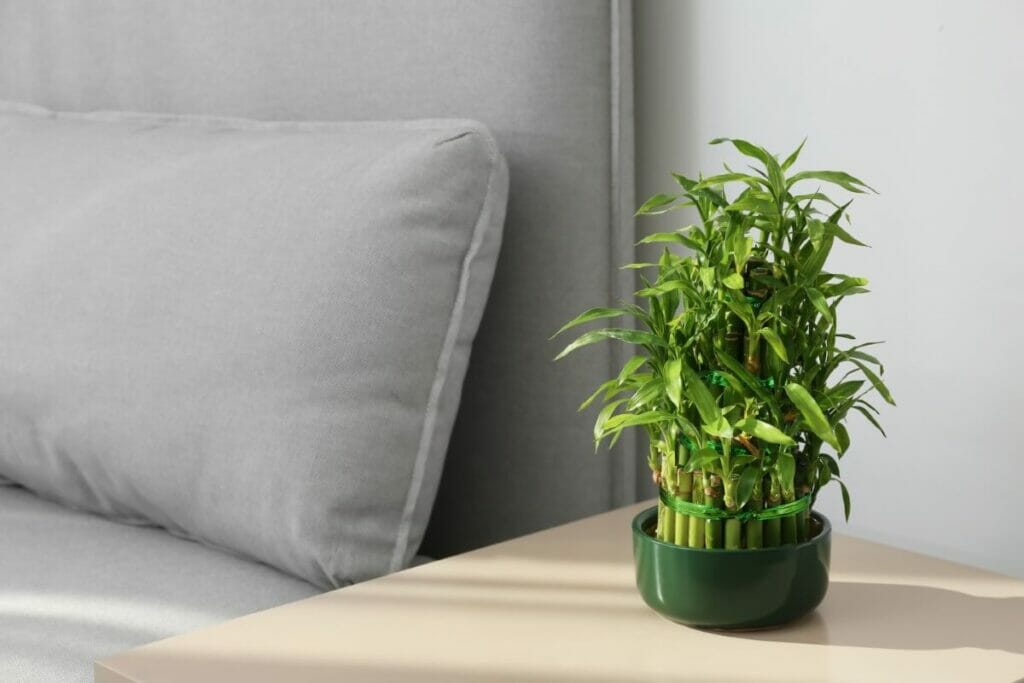
Lucky bamboo isn’t actually bamboo at all; it’s a type of dracaena plant. However, its thin stalks and soft sprouts of leaves resemble bamboo grass, and that’s where the plant’s common name comes from.
In feng shui, lucky bamboo is a highly popular plant for drawing good luck, prosperity, and wealth. With its tall, thin stalks it also provides the perfect shape for enhancing the wood element in your designs.
Lucky bamboo is also quite easy to grow. It prefers partial shade to medium filtered sunlight and can be grown in pretty vases of water with decorated water beads. Just be sure to change the water frequently to prevent bacterial growth and any foul smells that could put a damper on all the positive energy.
11. Orchids (Orchidaceae)

Orchids are thought to bring prosperity, good luck, and happiness. They also have strong associations with fertility, femininity, and romance. In feng shui, they can be placed in any Bagua map area to promote fruitfulness, abundance, and good luck. While plants are usually considered to have too much energy for placement in the bedroom, orchids are one of the few types of plants that can be placed in the bedroom to improve relationships and marriage.
Although there are tens of thousands of orchid species, and each has slightly different care and environmental requirements, most prefer to receive bright, filtered sunlight in a location with moderate to high humidity, and they must have a well-draining container with a soilless potting medium.
12. Arrowhead Plant (Syngonium podophyllum)
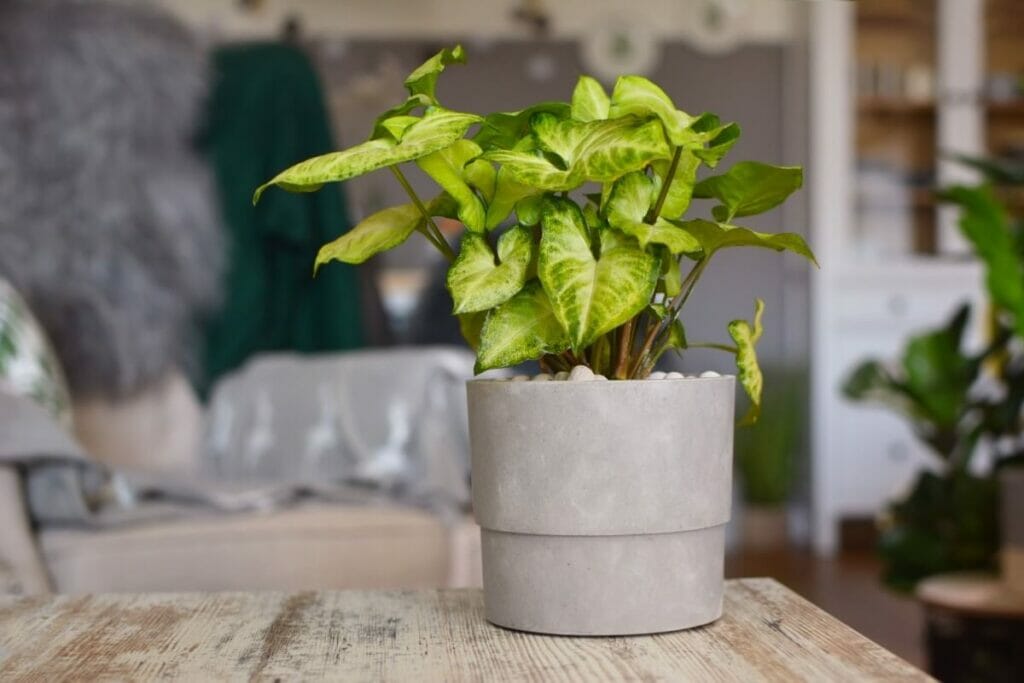
The arrowhead plant gets its name from the shape of its attractively variegated leaves, which feature five lobes a piece. In feng shui, these five lobes correspond to the five elements, creating a perfect balance of energy within the plant. This generates incredibly positive, balanced, harmonious energy in any space that can draw in good luck.
While these plants prefer high humidity, they can survive in moderate or average indoor humidity. They prefer medium to bright indirect sunlight. Direct sun can scorch their delicate leaves.
13. Peace Lily (Spathiphyllum)

In feng shui, peace lilies are said to convert negative energy or poison arrows into positive energy with their soft, flowing leaves and delicate white blossoms. For best results, place yours in a location in your home where you might experience more stress than normal, like inside the home office.
Peace lilies like to have their soil moderately moist at all times, and they do not tolerate direct sunlight well. As a result, any direct sun can dry out and scorch their leaves. Place yours in a location where it will receive lots of filtered, indirect sunlight.
14. Boston Fern (Nephrolepis exaltata)
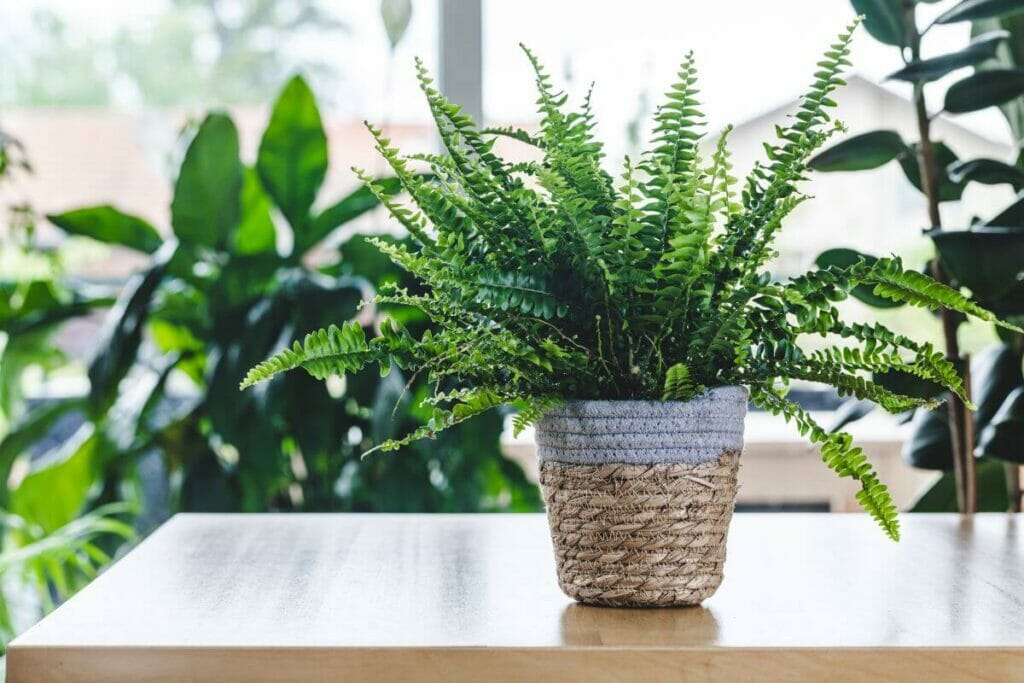
Boston ferns, with their soft, flowing tendrils, are considered to be lucky plants in feng shui that have the power to generate positive energy and absorb negative energy.
These plants require frequent watering, a humid environment, and filtered sunlight, which makes them a good choice for placing in or near a bathroom in your home since this is usually the most humid location where direct sunlight is not typically an issue with all windows covered.
15. Snake Plant (Dracaena trifasciata)

Despite their hard, pointed, lance-shaped leaves, many types of snake plants are actually associated with good luck and positive energy in feng shui. This might be due to the fact they possess an incredible ability to purify the air and that they are also easy to grow and care for.
With their upward-pointing leaves, snake plants can balance the heavy, downward energy of ceiling fixtures like fans or beams. Snake plants can thrive in just about any light level, but they prefer bright, indirect sun.
16. Golden Pothos (Epipremnum aureum)
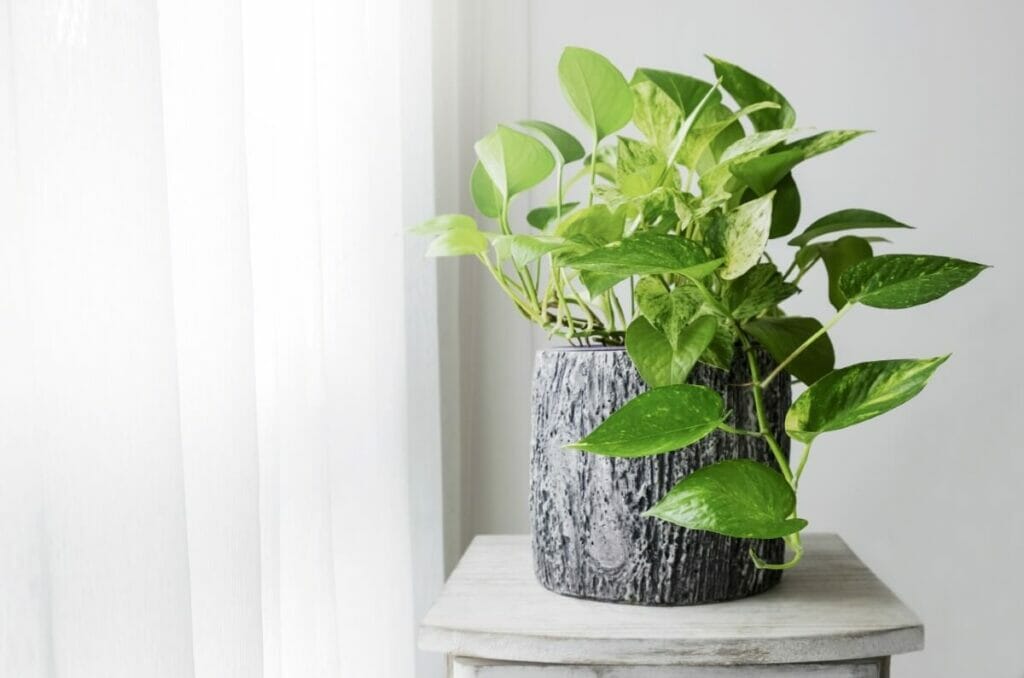
The golden pothos is one of the plants most strongly associated with positive energy in feng shui. This is thanks to the plant’s trailing vines of soft, heart-shaped leaves, its unbelievable hardiness, and the easy way it grows. Not only can golden pothos plants generate their own good-luck-making positive energy, but they also absorb the negative energy in a space.
These plants can thrive just about anywhere, so in feng shui practices, they are best placed in the dark corners of your home (like the tops of cabinets), where positive energy can get trapped and diminished.
17. African Violets (Streptocarpus sect. Saintpaulia)

African violets have soft, fuzzy, round leaves that symbolize wealth and often blossom with purple flowers, a color that symbolizes prosperity. In feng shui, these pretty plants can attract the energies of good luck, prosperity, and wealth.
African violets have a reputation for being finicky and difficult to grow, but the primary concern is with the way they’re watered. If you plant yours in a self-watering container that provides them with moisture from the bottom-up, then you shouldn’t have a problem raising healthy plants.
18. Jasmine Plants (Jasmine)

Thanks to their fragrant white flowers, jasmine flowers symbolize positive energy and abundant romance in feng shui, making them another suitable choice (especially their cut flowers) for the bedroom.
To grow a jasmine plant indoors, you’ll need a fairly sunny location that provides the plant with at least six hours of full sun each day and two to four hours of partial sun or shade each day. They also require evenly moist soil and prefer moderate to high humidity.
19. Chinese Evergreen (Aglaonema)

Chinese evergreens are a highly popular houseplant thanks to their attractive variegated foliage that often contains bright-red or silvery markings against a vibrant green background. These plants symbolize nature and purity, and, in feng shui, they draw in positive energy and bring good luck.
Aglaonema plants thrive in full shade to partial filtered sun and prefer evenly moist soil that never becomes soggy or waterlogged. Water only when the soil has dried completely.
Happy, Healthy Plants for a Wealthier, Luckier, and More Prosperous Home
Whenever using plants in feng shui designs, be mindful that the health of the plant is of the utmost importance. Placing a lucky plant in a location in your home that does not offer the right environment for the plant to thrive will lead to the plant’s health deteriorating, and it will subsequently create negative energy in the space.
So, when you shop for feng shui plants for your home, pay close attention to their care and environmental requirements to make sure you’ll have a happy, healthy plant producing plenty of positive energy.
Further reading: Discover the Best Feng Shui-Friendly Hanging Plants.
Andrew is the Editorial Director at Petal Republic. He holds a BSc degree in Plant Sciences and has trained professionally at leading floristry schools in London and Paris. In amongst overseeing a global editorial team, Andrew's a passionate content creator around all things flowers, floral design, gardening, and houseplants.

Love your site, so interesting, but I keep going out and buying more plants. Are your instructions suitable for UK growing. Please don’t stop. regards, WH
I was looking for plants with meaninful signification to put in my office. Your article was very well documented thank you. I love plants and now I can have one without messing with my office energy.